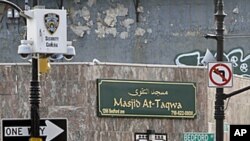The New York Police Department is reported to have conducted widespread surveillance against the local Muslim community, raising concerns that law enforcement may have overstepped its constitutional authority.
The Associated Press has reported that the New York Police Department collected intelligence on more than 250 mosques and Muslim students groups in and around New York City. The report says the NYPD also maintained a close relationship with the Central Intelligence Agency, which is prohibited from domestic spying. Last month, the news agency reported a secret squad known as the Demographics Unit sent NYPD undercover officers to keep tabs on the Muslim community.
Cyrus McGoldrick, civil rights manager for the New York chapter of the Council on American-Islamic Relations, says the reports confirm the community’s suspicions of police surveillance.
“The common denominator of the communities they were surveying is Islam, is religion, and is quite clearly religious, if not ethnic profiling,” said McGoldrick.
Criminalizing an ideology
McGoldrick says such profiling violates several constitutional protections, including a prohibition against government searches without probable cause and denial of the right to free exercise of religion.
“What this is doing is not investigating crime, but criminalizing an ideology, and it tells the American Muslim that your thoughts, your beliefs and your institutions are not welcome here,” he said.
Constitutional expert Joseph Schmitz, an attorney and former Defense Department Inspector General during the George W. Bush administration, says Muslim extremists have cited Islam, the Quran and Sharia Law as justification of their doctrine of jihad, or holy war against the United States.
“So for the New York PD to pretend that there is not an ongoing religious jihad against American citizens right now by people who identify themselves as Muslims - that would be grossly irresponsible," said Schmitz. "Now, does that mean that every Muslim in the United States is engaged? Of course not. That would be ludicrous.”
NYPD crossing the line?
Schmitz says he is not sufficiently familiar with details of the reported surveillance to determine if it would meet the constitutional requirement for probable cause, or legitimate suspicion of actual crime. Illegitimate suspicion of an entire group, he says, is known as invidious discrimination.
“If you’re discriminating against someone because of the color of their skin or because of their religious faith or because of any other category that the law recognizes as being the basis for invidious discrimination, then you’ve crossed the line,” he said.
Donna Lieberman, Executive Director of the American Civil Liberties Union in New York agrees that blanket surveillance crosses the line, violating in this case not only the rights, but the trust of millions of law-abiding and patriotic American Muslims.
“When being Muslim immediately generates suspicion, then how can you trust that your goodwill will be reciprocated? How can you trust that you will be taken in good faith when you try to help?," she said.
Perspective after 9/11
Lieberman says no American would tolerate blanket police surveillance of a church or synagogue. She notes, however, that many Americans see Muslims differently after the September 11, 2001 terrorist attacks on the United States.
“To the extent that we have succeeded in demonizing Muslims and Arabs and South Asians, as ‘the other,’ not us - whoever we may be - that’s the extent that it becomes OK in people’s minds to subject that community to a different set of rules,” she said.
Lieberman and Joseph Schmitz both cite historic precedent when Japanese-Americans were placed in internment camps during World War II, and German-Americans were viewed with suspicion during the First World War. Neither says such history justifies violating the rights of Muslim-Americans today. Cyrus McGoldrick adds that such violations, if in fact they occurred, breed resentment and mistrust that undermine the security the surveillance is meant to protect.
The New York Police Department did not respond to VOA’s request for a comment on the surveillance report.
New York Police Reportedly Spy on American Muslims




